News
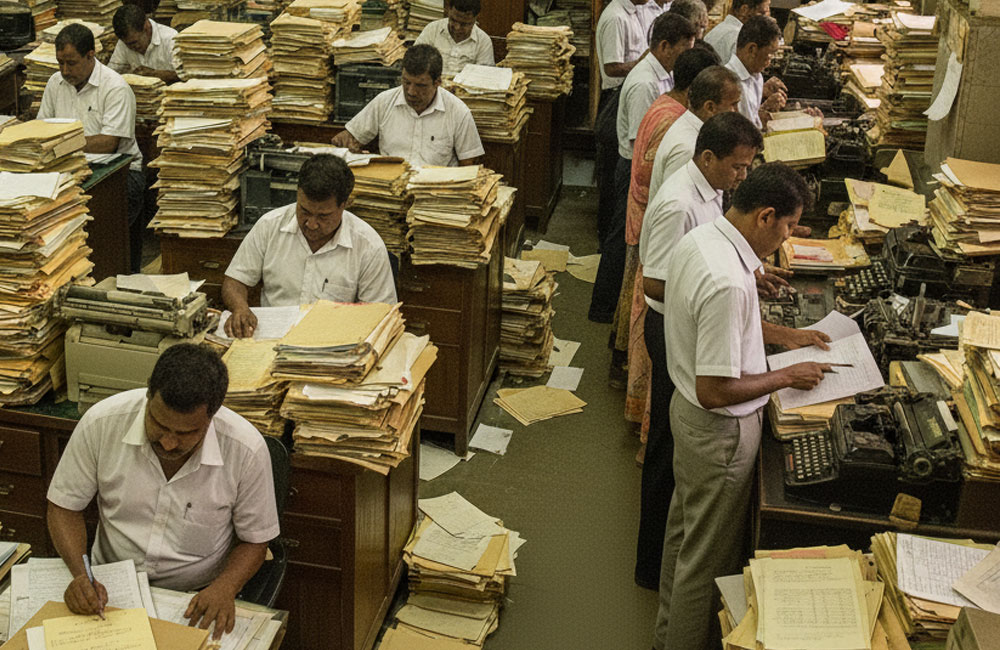
Sri Lanka Confronts Bloated, Inefficient Public Sector in New Reforms
Sri Lanka’s long-standing struggle with an oversized, top-heavy and bottom-heavy public sector moved back into focus this week when an interim report proposing a structured salary framework and improved professionalism in the public service was presented to the Ministerial Consultative Committee on Public Administration.
The report, tabled by subcommittee chairman and MP Chandana Sooriyarachchi, outlines initial steps toward modernising state institutions that have suffered from decades of politicisation, inconsistent recruitment, and chronic inefficiencies.
Sri Lanka currently maintains one of the largest public sectors in Asia relative to population, employing more than 1.52 million workersroughly one in every six employed persons in the country.
According to Treasury data, public-sector salaries and pensions absorb more than 54% of annual government revenue, leaving limited fiscal space for development spending. Economists have repeatedly warned that the structure of the public service is highly imbalanced: it is overloaded with clerical and minor staff while critically short of skilled professionals, technical experts, and policy-level officers.
Against this backdrop, the interim report proposes establishing a formal institution to design a structured salary system, harmonise pay scales, and introduce merit-based career progression. The goal, officials say, is to reduce disparities across ministries, curb politically driven appointments, and create a more professional service aligned with national development needs.
The Committee meeting, chaired by Minister A.H.M.H. Abeyrathna, also examined growing administrative issues at Divisional Secretariats and Local Government bodies. MPs highlighted severe delays in service delivery, understaffing of critical units, and the absence of a standardised performance monitoring mechanism.
Committee members instructed ministry officials to address these issues urgently, particularly at offices where citizens face long queues for essential documents, land transactions, and welfare services.
Another contentious issue discussed was the pension entitlements for public servants who later become Members of Parliament. Current rules disqualify an MP from receiving a parliamentary pension while also complicating claims for pensions from previous state-sector positions if they served more than ten years. The committee acknowledged the need to resolve this anomaly and agreed to pursue further deliberations.
Confusion within the public service over the Public Service Commission’s recent alterations to efficiency bar examinations, recruitment criteria, and promotion procedures was also raised. Ministry officials conceded that the changes had created disparities across departments and pledged to reassess the policy shift.
Analysts argue that modernising the public sector will require more than harmonising salaries. Solutions include a comprehensive manpower audit, eliminating redundant positions, digitalising frontline services, retraining underutilised staff, and depoliticising appointments. Without structural reform, Sri Lanka’s bloated public sector is expected to continue consuming scarce revenue while delivering inadequate results.
With fiscal pressures mounting and the IMF emphasising public-sector rationalisation under its ongoing programme, the government now faces a narrow window to turn recommendations into action. Whether the proposed reforms can break decades of institutional inertia remains the central question.
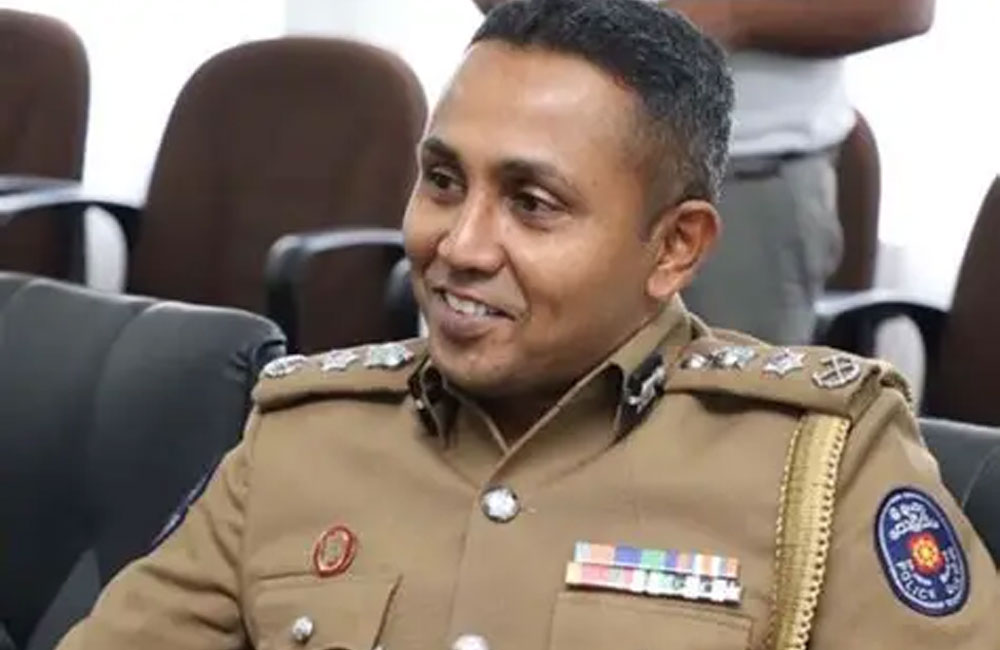
SDIG Lalith Pathinayake Removed from Administrative Post Pending Disciplinary Action
Senior Deputy Inspector General of Police (SDIG) Lalith Pathinayake, who had been serving as the Acting Senior DIG in charge of the Police Administration Division, has reportedly been removed from the position by the National Police Commission pending disciplinary action.
Despite this, Pathinayake will continue in his role as the Senior DIG in charge of the Central Province.
Meanwhile, the National Police Commission has approved the appointment of Senior DIG Sanjeewa Dharmaratne—currently overseeing the Western Province—to the post of Senior DIG in charge of the Police Administration Division, which became vacant following Pathinayake’s removal.
SDIG Dharmaratne is also functioning as the Acting Inspector General of Police (IGP), as IGP Priyantha Weerasuriya is presently overseas.
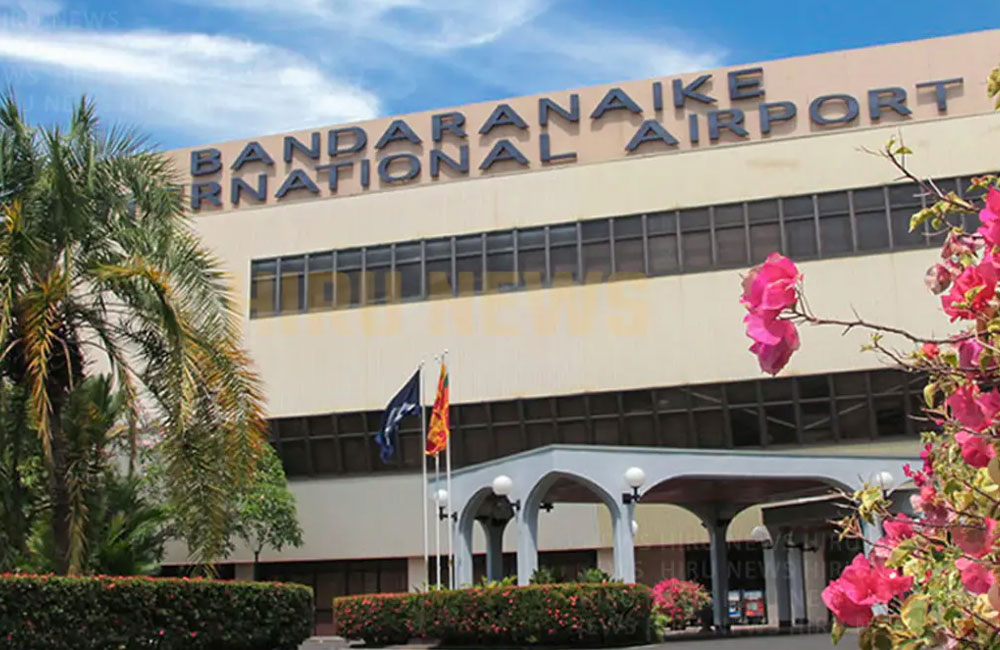
BIA Bets on Digital Check-In Surge as Winter Travel Boom Nears
Sri Lanka’s main international gateway is preparing for one of its busiest winter seasons in years, with SriLankan Airlines’ Airport and Ground Services rolling out an expanded self-check-in system aimed at easing terminal congestion and modernising the passenger experience.
With more than 300,000 tourists expected in December alone, the airline has accelerated its digital push, installing 20 new self-check-in kiosks last month. The upgrade brings the total number of kiosks at Bandaranaike International Airport (BIA) to 28, marking one of the most significant technology-driven service improvements since the pandemic.
A Rapid Shift Toward Self-Service Travel
Since the initial launch of the kiosk system in 2023, passenger adoption has climbed steadily. Today, around 15% of SriLankan Airlines outbound passengers complete their check-in through self-service rather than traditional staffed counters. Airport officials say this shift is already easing pressure on peak-hour queues, offering a faster and more predictable departure process.
The kiosks allow travellers to select seats, print boarding passes and generate baggage tags independently reducing wait times and freeing staff to manage complex travel needs. The airline expects usage to rise steadily as more foreign carriers integrate the system.
Majority of Passengers to Benefit as Foreign Airlines Join In
SriLankan Airlines Airport and Ground Services Head Deepal Pallegangoda said the move is especially significant because customer airlines account for roughly 60% of all passengers handled at BIA.
“We are thrilled to extend the self-check-in service to our customer airlines,” he noted. “Our aim is to deliver a seamless travel experience for the more than 300,000 passengers who pass through each month, especially as we approach the winter peak.”
In a major endorsement of the new system, Singapore Airlines will become the first foreign carrier to offer kiosk check-in for passengers flying out of Colombo. Aviation sources say more airlines are expected to follow, enabling BIA to align with global self-service airport trends seen in hubs like Changi, Dubai and Heathrow.
Impact: Faster Processing, Lower Congestion, Better Tourism Readiness
The expansion arrives at a crucial moment for Sri Lanka’s tourism recovery. With arrivals climbing and transit traffic growing, airport congestion has become a recurring concern. Airport officials say the upgraded digital system will:
- Improve passenger flow during peak hours
- Reduce counter wait times, especially for large transit groups
- Increase terminal handling capacity without new infrastructure
- Boost Sri Lanka’s reputation as a modern, tourist-friendly destination
As thousands of inbound, outbound and transit passengers move through BIA daily, SriLankan Airlines says it is now “fully geared” for the seasonal surge, with digitalisation forming the backbone of its efficiency strategy.
With the winter travel wave approaching and more airlines expected to adopt kiosk check-in, the new system could mark a turning point in how Sri Lanka manages airport capacity—and how travellers experience Colombo’s international gateway.
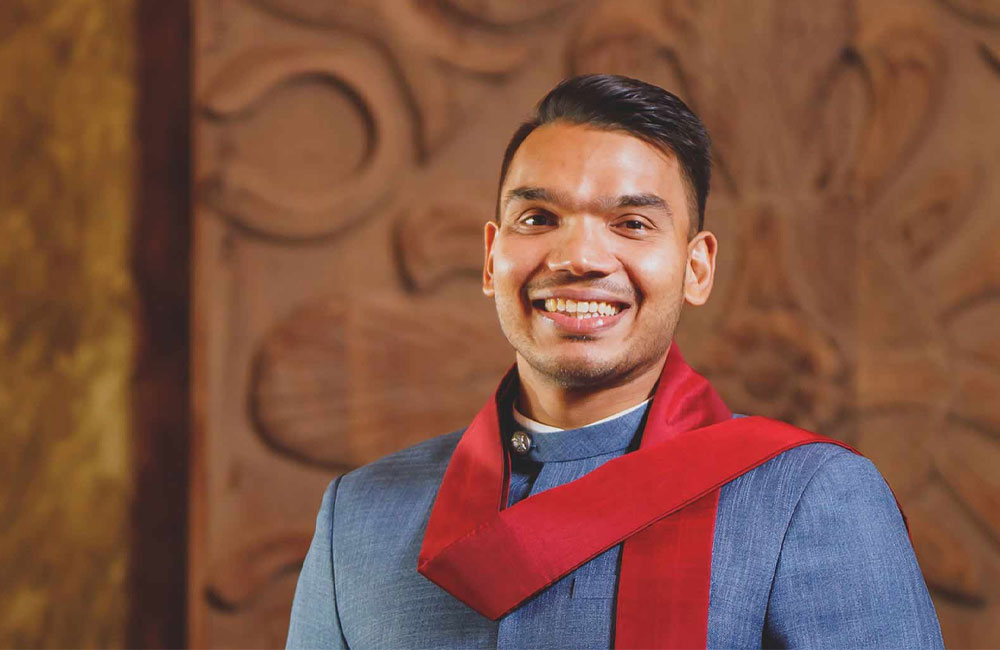
Namal: Rally Will Highlight Public Hardships and Govt Failures
Parliamentarian Namal Rajapaksa has accused the government of imposing what he described as a severe crackdown on public servants, noting that the current environment has become increasingly difficult for many.
Speaking to the media after paying homage at the Sri Dalada Maligawa in Kandy, Rajapaksa alleged that the Sri Lankan Police have become “fully politicized” and claimed that national security has weakened.
He further stated that the public continues to suffer under a heavy tax burden introduced by the government.
The MP urged all citizens who feel they have been unfairly treated to join the opposition rally scheduled to take place in Nugegoda on November 21.
Rajapaksa emphasized that the rally is not intended to elevate any individual to power, but to remind the government of the promises it made to the people.
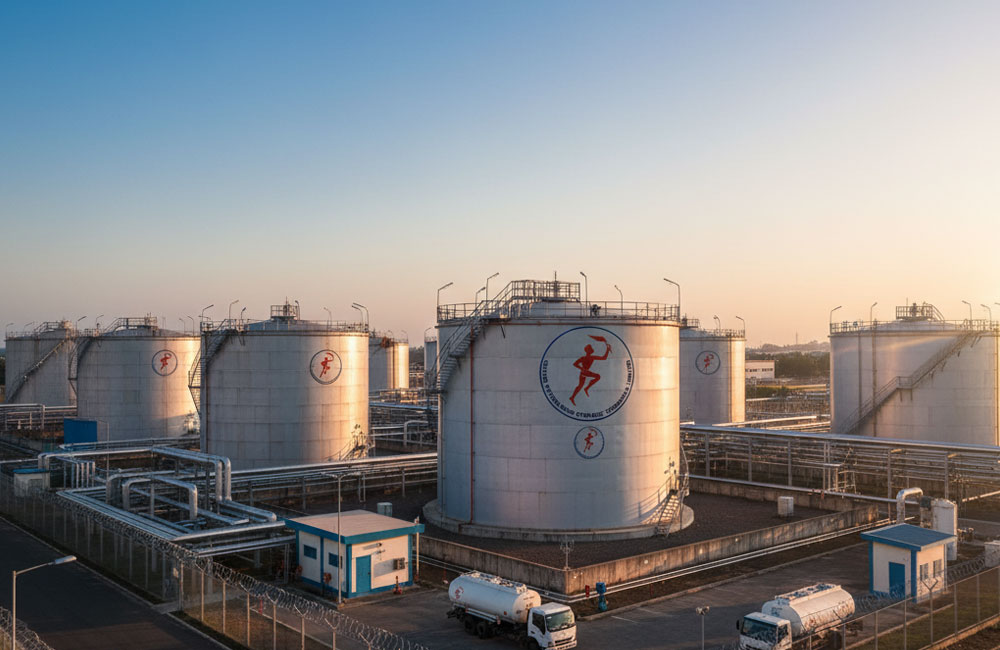
Sri Lanka Races to Expand Fuel Storage amid Rising Risks
In a bid to prevent a repeat of the crippling fuel shortages experienced during the 2022 economic crisis, the Cabinet this week approved a major overhaul of the country’s petroleum storage network including the construction of new tanks and the replacement of aging ones at the Kolonnawa and Muthurajawela terminals.
The move aims to enable the Ceylon Petroleum Storage Terminal Company (CPSTL) to maintain a minimum fuel buffer equivalent to 45 days of national demand, a target long recommended by energy-sector auditors but never fully achieved.
Cabinet has cleared the CPSTL to finance the project using its own funds, noting the urgency of strengthening the resilience of Sri Lanka’s petroleum supply chain. CPSTL currently manages more than 90 percent of the country’s petroleum storage and distribution, yet much of its infrastructure some built in the 1940s has exceeded its safe operational lifespan.
According to Cabinet Spokesman and Minister Dr. Nalinda Jayatissa, six new storage tanks with a combined capacity of 64,000 cubic metres are already under construction at Kolonnawa. At the Muthurajawela terminal the country’s single largest petroleum hub procurement has begun for three additional tanks totalling 40,000 cubic metres.
Two decades-old tanks at Kolonnawa, numbered 30 and 31, will also be dismantled and replaced with modern 7,000- and 15,000-cubic-metre units to improve structural safety and reduce maintenance risks.
Energy analysts note that Sri Lanka’s total usable storage capacity remains inadequate relative to consumption. The country requires at least 1.2 million metric tonnes of operational storage to safely cushion supply disruptions, but current capacity is less than two-thirds of that.
Daily fuel usage has climbed back to 14,000–15,000 tonnes, driven by a post-crisis rebound in transport and power generation, forcing the government to rely heavily on frequent import cycles. Even minor delays weather-related shipping disruptions, global price spikes, or supplier credit tightening can trigger islandwide shortages.
The proposed tank expansion, therefore, is viewed as crucial but not sufficient on its own. Energy-sector experts argue that increasing storage at existing sites provides only a partial solution.
Both Kolonnawa and Muthurajawela sit near densely populated urban zones, where land constraints, safety risks, and environmental sensitivities limit large-scale expansion. Some experts also caution that without long-term procurement planning and a shift to competitive tendering, larger storage volumes could simply magnify the financial burden of imports during periods of high global oil prices.
CPSTL officials, however, insist the additional capacity will improve flexibility, allowing the country to purchase larger volumes during favourable price windows and reduce dependency on emergency shipments. Improving tank-to-pipeline connectivity and modernising pumping systems are also expected to cut unloading times at ports, which currently average 36–48 hours per tankeramong the slowest in the region.
While the latest Cabinet approval marks a significant step forward, the broader question remains: can Sri Lanka build enough buffer capacity and adopt the right procurement strategy to truly insulate the economy from future fuel shocks? For now, the expansion of the Kolonnawa and Muthurajawela terminals appears to be the country’s most immediate line of defence.

Seven killed, 27 injured in explosion at police station in India’s Kashmir, NDTV reports
At least seven people were killed and 27 injured when a large pile of confiscated explosives in a police station in India’s Kashmir detonated late on Friday, broadcaster NDTV reported, citing sources.
Most of those killed are policemen and forensic team officials who were examining the explosives stored at the police station, the report said.
The death toll could climb further, with five of the injured still in critical condition, NDTV said.
Reuters could not immediately verify the reason for the blast. Jammu and Kashmir police did not immediately respond to Reuters requests for comment.
Earlier, a local police official told Reuters that an explosion had ripped through Nowgam police station. The official said fire had engulfed the compound and fire tenders had been rushed to the spot, with casualties feared.
The blast comes four days after a deadly car explosion in Delhi, which killed at least eight people in what India has called a terror incident.
(Source : adaderana.lk)

COPE Flags Massive Delays at ECT: Billions Lost as Colombo Port Expansion Stalls
The long-delayed East Container Terminal (ECT) project at the Colombo Port has again come under intense scrutiny, with the Committee on Public Enterprises (COPE) warning that prolonged construction setbacks are inflicting a heavy financial and economic toll on both the Sri Lanka Ports Authority (SLPA) and the wider economy.
At its latest meeting on 13 November, chaired by Dr. Nishantha Samaraweera, COPE examined the Auditor General’s Reports for 2022 and 2023 and reviewed the SLPA’s current performance. The session expanded on issues first raised when the Ports Authority was summoned in September—this time focusing sharply on the stagnated progress of the ECT, one of the country’s most strategic port expansions.
A Project Already Years behind Schedule
The committee revealed that Cabinet approval had been granted back in November 2021 to award a Rs. 40.27 billion construction contract for developing the ECT. Despite agreements being finalized the following month, construction originally scheduled for completion by 3 January 2025—has suffered prolonged disruptions.
Due to extended delays, the expected completion date has now been pushed to July 2026, a 548-day setback. COPE members warned that such slippage is far more than a scheduling issue—it has turned into a multimillion-rupee economic burden.
Rs. 4.2 Billion Compensation Claim Raises Alarms
In what COPE described as a direct financial consequence of the delay, the contractor has already lodged a Rs. 4.23 billion compensation claim. The committee demanded a comprehensive report detailing the contractual, management, and operational lapses that allowed the project’s timeline to spiral out of control.
Committee members made it clear that these delays could not be viewed in isolation. Every day the ECT remains incomplete, Sri Lanka forfeits potential revenue from handling growing regional transshipment demand—business that may instead shift to competing ports such as Dubai, Singapore, or India’s emerging terminals.
Economic Impact: Lost Throughput, Lost Revenue, Lost Reputation
SLPA officials told COPE that construction is now progressing “rapidly” and assured completion within the revised timeframe. But experts warn that the economic impact is already being felt:
Lost handling capacity has limited Colombo Port’s ability to attract new shipping lines.
Regional competitors are capturing transshipment volumes Sri Lanka could have secured.
Higher project costs and compensation claims threaten SLPA’s already strained finances.
Delays jeopardize investor confidence, critical as Sri Lanka seeks foreign investment to stabilize its post-crisis economy.
Industry analysts note that the ECT is essential for Colombo to maintain its competitive edge as South Asia’s premier transshipment hub. Failure to deliver the project on time risks undermining long-term port revenue generation one of Sri Lanka’s most stable foreign-exchange sources.
Other Irregularities Surface during COPE Review
Beyond the construction slowdown, COPE also raised concerns about several governance and administrative lapses within the Ports Authority:
Food expenditures for employees remain high, despite previous COPE directives in 2023. SLPA officials claimed they have now introduced competitive tendering to reduce costs.
Legal action over encroached port lands has been sluggish, with the committee urging immediate enforcement of court orders to recover properties.
Questions were raised over the renaming of the Seeduwa Raddolugama Sports Club and the recruitment of its players as SLPA employees—practices COPE hinted may reflect misuse of institutional resources.
Call for Accountability as Delays Mount
With the ECT now expected to be delayed by more than a year and a half, the committee signaled that accountability must be enforced to prevent further losses. For Sri Lanka still struggling with post-crisis economic recovery the prolonged delay of such a critical infrastructure project risks deepening financial strain at a time the country can least afford it.

Heavy Rainfall Expected in Several Provinces as Weather Disturbance Persists
The Department of Meteorology reports that the low-level atmospheric disturbance located to the east of Sri Lanka continues to influence the island’s weather.
As a result, showers or thundershowers are expected at times in the Northern, North-Central, and Eastern provinces. According to the advisory, heavy rainfall of around 100 mm is likely in parts of the Northern Province and the Trincomalee District.
Several other areas of the island will experience showers or thundershowers after 1.00 p.m. Fairly heavy rainfall exceeding 75 mm is possible in the Western, Sabaragamuwa, Central, Southern, and Uva provinces.
Misty conditions may also occur in parts of the Western, Sabaragamuwa, Central, Southern, and Uva provinces during the early morning hours.
The public is advised to take necessary precautions to minimize harm caused by strong, localized winds and lightning during thundershowers.

Shah Rukh Khan Honoured as Dubai Skyscraper ‘Shahrukhz’ Officially Unveiled
Bollywood icon Shah Rukh Khan has been honoured with a Dubai skyscraper named after him, marking a significant tribute to his global influence.
The tower, titled “Shahrukhz by Danube,” was officially launched at an event held in Mumbai on Friday, November 14.
Rizwan Sajan, Founder and Chairman of the Danube Group, praised Khan’s enduring legacy and star power during the ceremony.
The 56-storey commercial tower will also feature a statue of Shah Rukh Khan at its entrance, showcasing his iconic Dilwale Dulhania Le Jayenge pose.
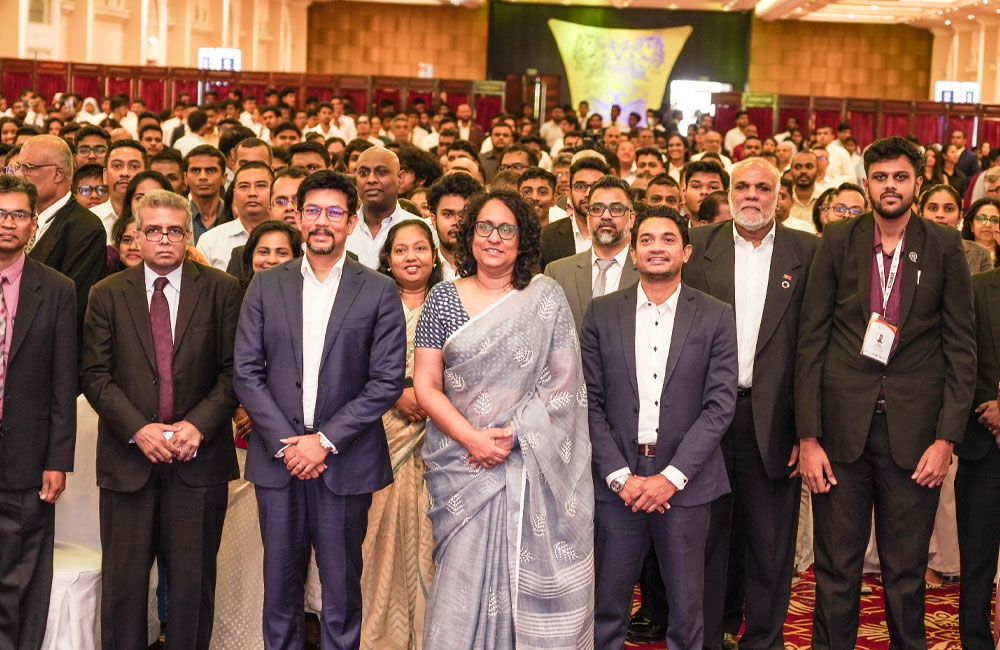
Global Entrepreneurship Week 2025 Begins Under the Patronage of the Prime Minister
Prime Minister Dr. Harini Amarasuriya stated that as the country moves towards a digital economy through a new transformation, all sectors must work together in the national mission of empowering local entrepreneurs.
The Prime Minister made these remarks while participating in the inauguration ceremony of Global Entrepreneurship Week held under the theme “Together We Build” at Temple Trees Premises yesterday (14). The event was organized by the Ministry of Digital Economy.
Addressing the event, the Prime Minister further stated,
Global Entrepreneurship Week 2025 begins today. It actively contributes to building an entrepreneurial culture in the country and creating the necessary opportunities for that purpose. This week aligns with our national objectives. Creativity, collaboration, and innovation are vital for the future development of the country.
Our government’s vision is to create a country where ideas become opportunities, innovation attracts investment, and citizens can benefit from them. Entrepreneurial development is essential for achieving this vision. Similarly, Entrepreneurship is also a crucial factor for economic diversification, export growth, youth empowerment, and balanced development
During Global Entrepreneurship Week in 2024 over 20,000 people engaged in more than 207 programs conducted across 25 districts island wide.
According to the 2024 Global Innovation Index, Sri Lanka ranks 89th place. Although we show relatively good performance in innovation outputs, data makes it clear that innovation inputs such as infrastructure and investment still at a weak level.
The Global Entrepreneurship Monitor (GEM) Report (2024/25) states that 49% of adults worldwide refrain from starting a business due to fear of failure. This highlights the importance of building a strong support system.
In 2023, Sri Lanka gained a significant demographic advantage, with a youth population of approximately 5.1 million aged between 15 and 29 (23.6% of the total population). Although this youth population is digitally literate, we understand that they still face challenges such as limited access to capital, fewer mentorship opportunities, and a general reluctance to take risks.
Therefore, the government has established a - Digital Task Force consisting of 30 members under education reforms. Measures are being implemented to connect all schools to the internet, provide smart boards, computers, and digital devices, and enhance knowledge. A full policy framework for digital education is being prepared to be presented to the Cabinet by March 2026.
The 2026 National Budget has allocated Rs. 1.5 billion as a Start-Up Fund to advance the digital economy and entrepreneurship among youth and emerging entrepreneurs.
Additional provisions have been allocated for AI and cloud computing research, digital infrastructure development (broadband vouchers), and investment incentives. I would also like to mention that the government has proposed a Digital Economy Act, a new Digital Economy Authority, the Sri Lanka Unified Digital Identity (SL-UDI), and an Integrated Digital Payments System.
For the development of the economy and every sector of the country, we must all work together for a national agenda. Rather than working separately, it is necessary for all to start a collaborated national movement.
The government, industry, academia, and entrepreneurs must collaborate in resource mobilization, building mentorship networks, simplifying regulations, and opening access to global markets.
The event was attended by the Deputy Minister of Digital Economy Eng. Eranga Weeraratne, Deputy Minister of Industries and Enterprise Development Chathuranga Abeysinghe, President’s Advisor on Digital Economy Dr. Hans Wijayasuriya, Secretary to the Ministry of Digital Economy Varuna Dhanapala, as well as entrepreneurs, investors, and a large gathering.
Prime Minister’s Media Division
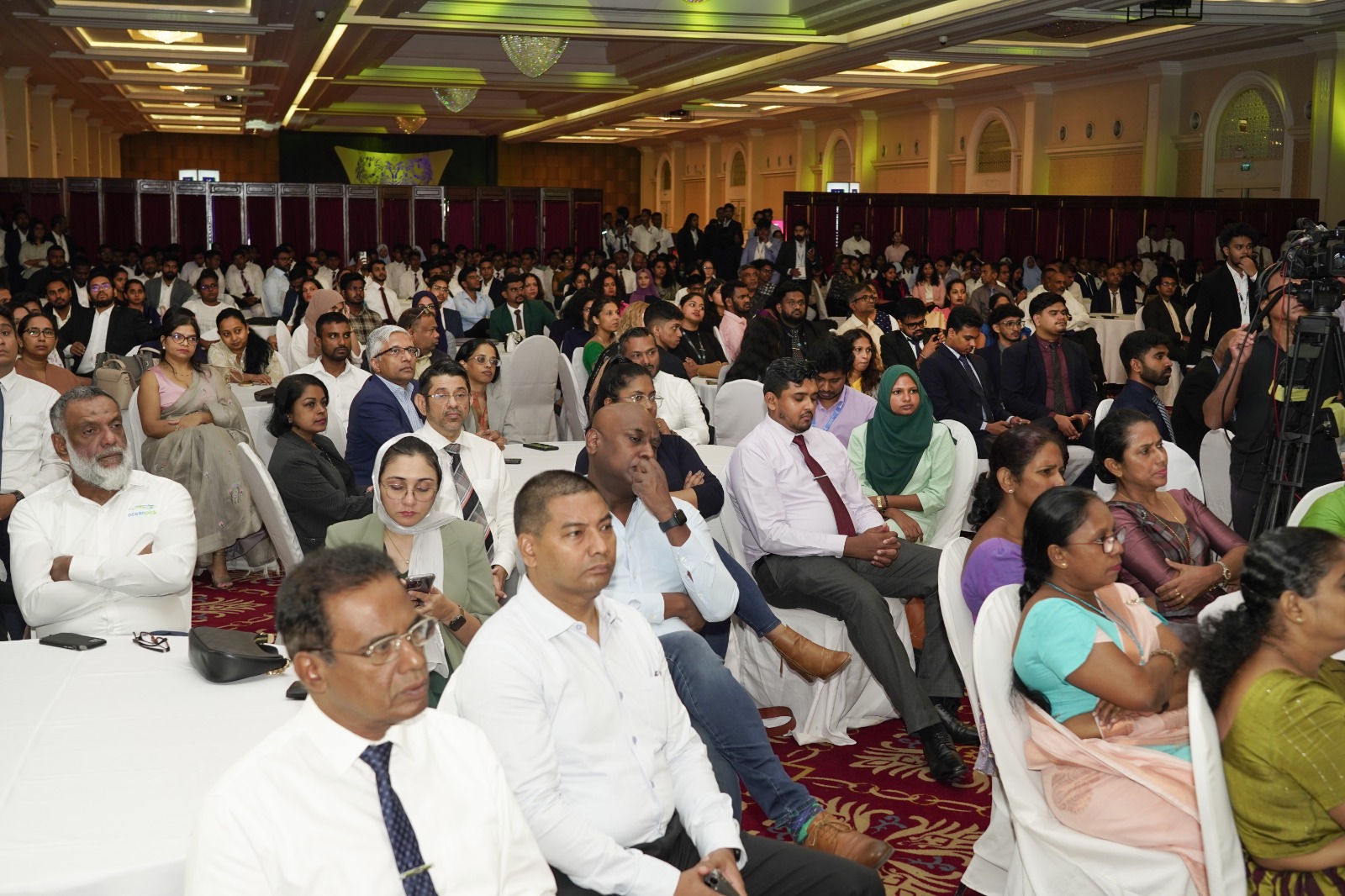
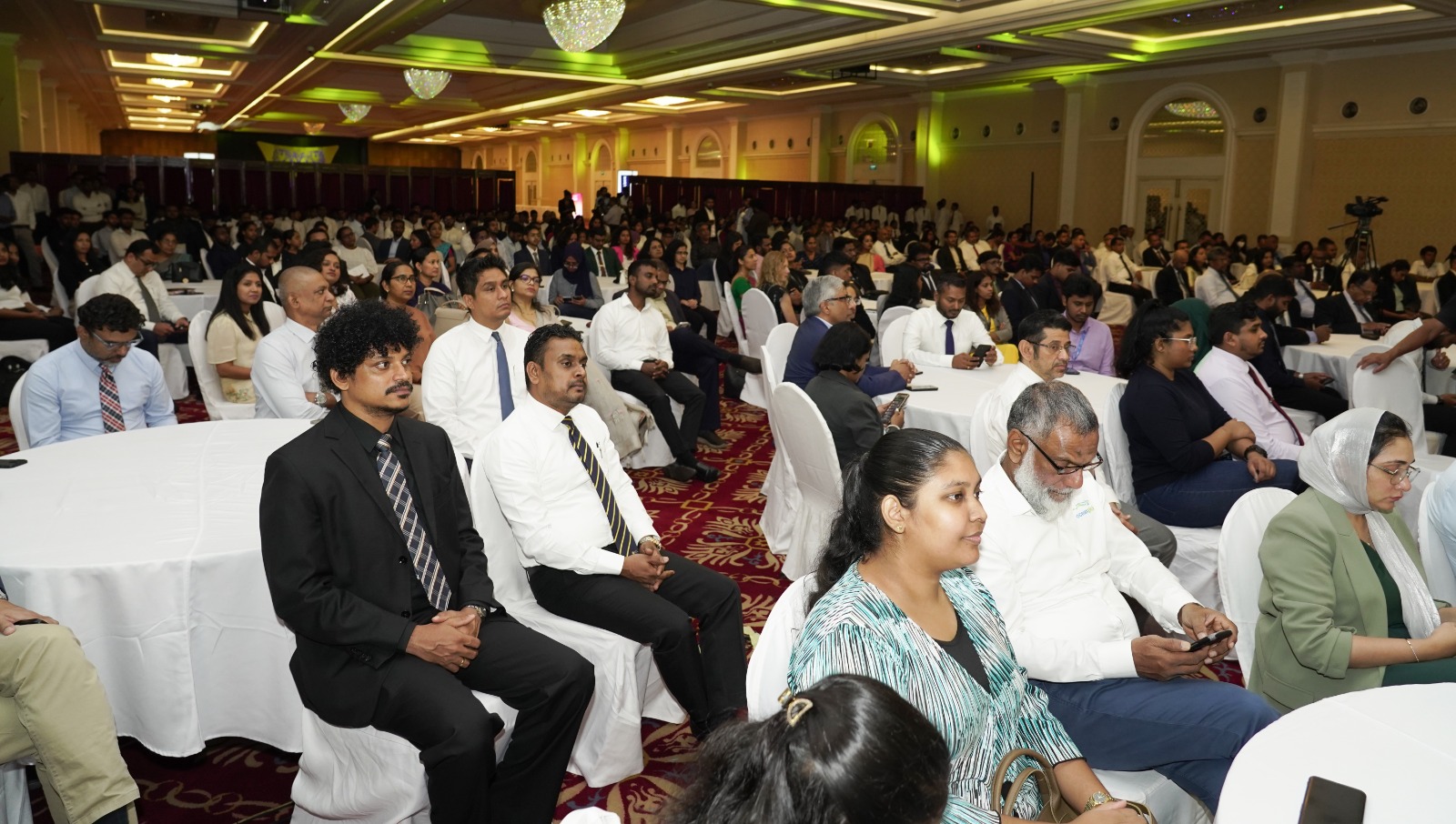
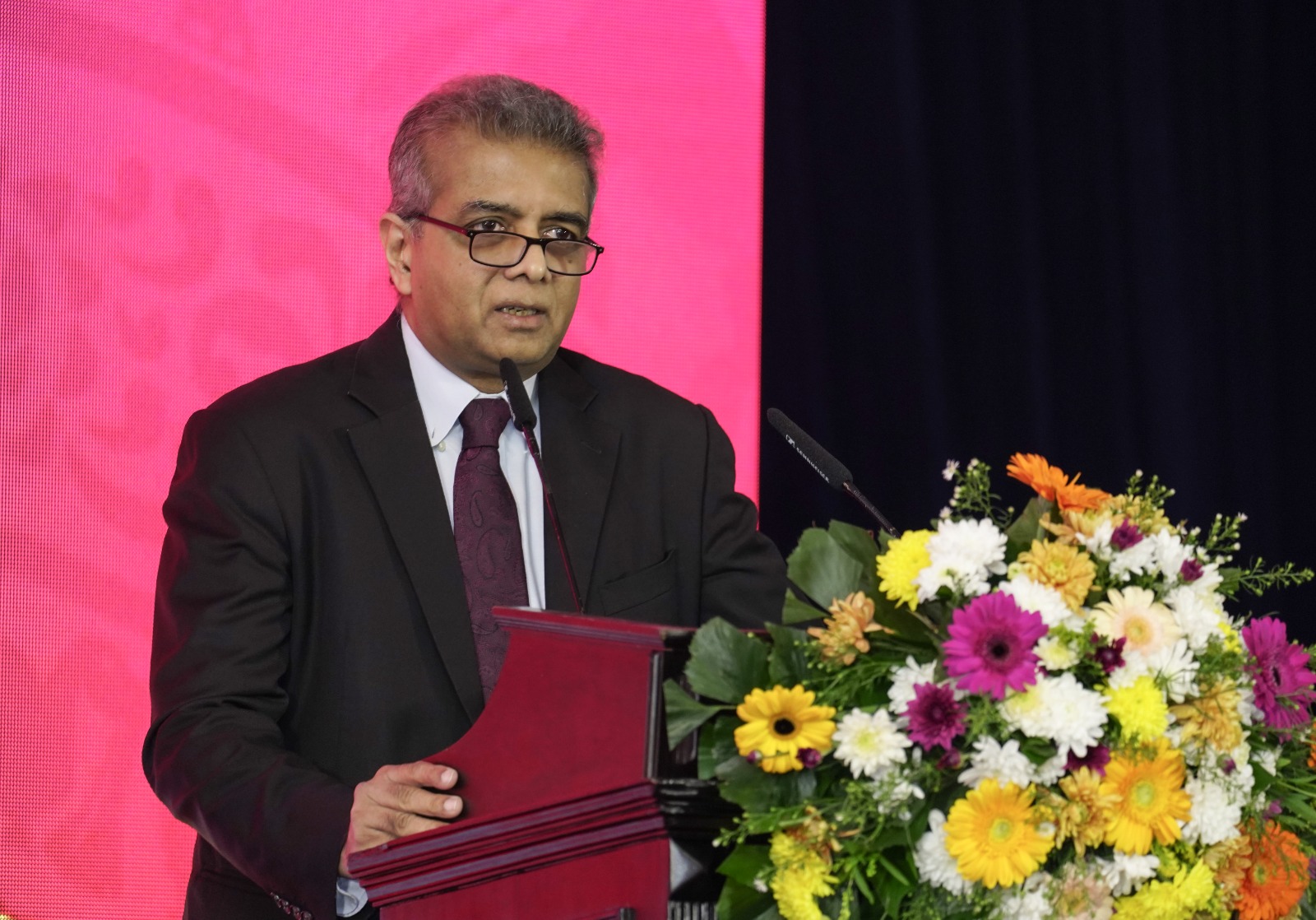
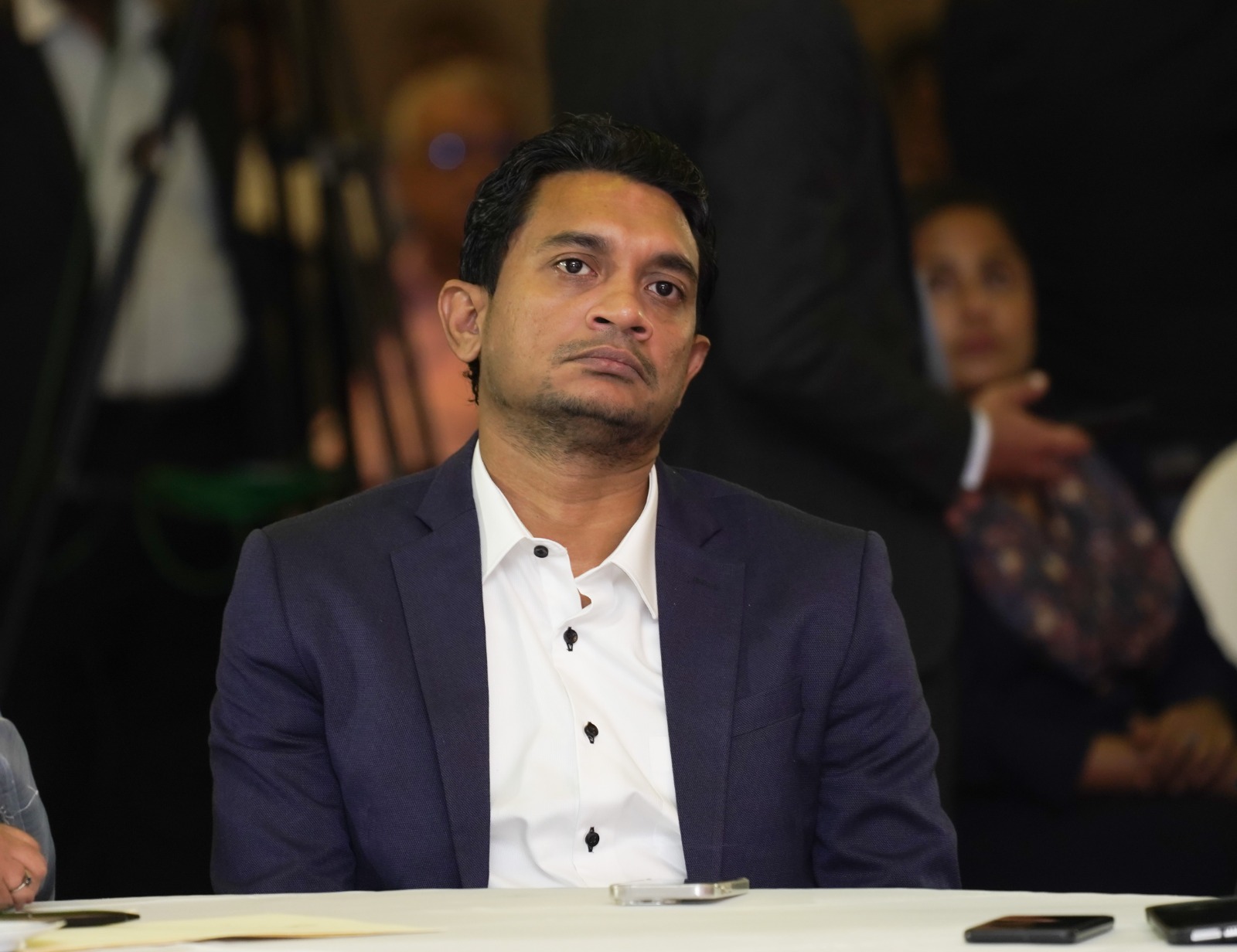
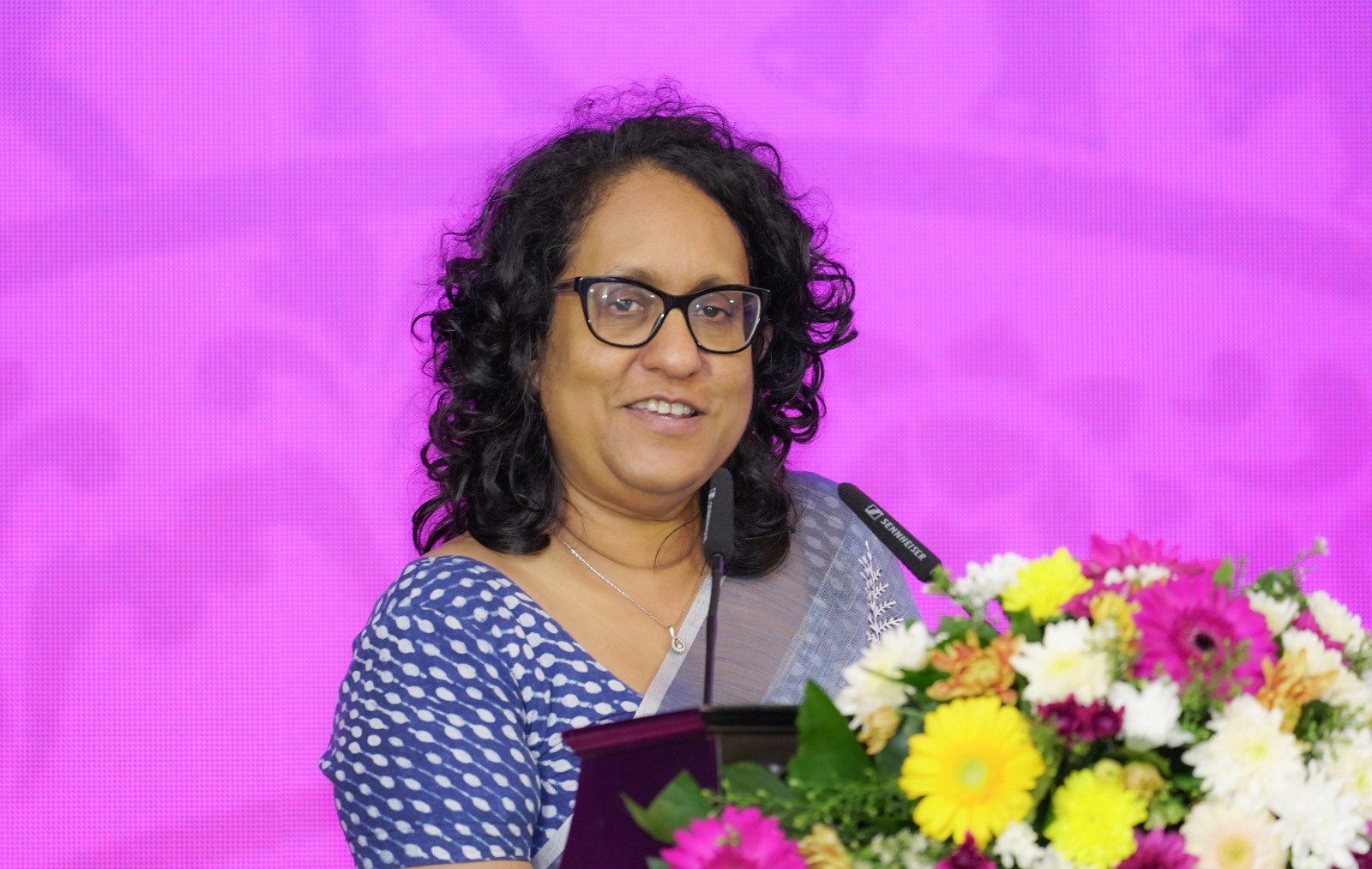

Trump says will sue BBC for up to US$5 billion over video edit
US President Donald Trump said Friday (14) he would sue the BBC for up to US$5 billion after the British broadcaster apologised for a misleading edit of one of his speeches but said it would not pay damages.
“We’ll sue them for anywhere between a billion and five billion dollars, probably some time next week. I think I have to do it. They’ve even admitted that they cheated,” Trump told reporters aboard Air Force One.
Trump’s lawyers sent the BBC a letter on Monday accusing it of defaming the president with the video of the speech before the 2021 US Capitol riot and giving it until Friday to apologise and pay compensation.
“The people of the UK are very angry about what happened, as you can imagine, because it shows the BBC is fake news,” Trump said late Friday.
He added that he planned to raise the BBC issue with British Prime Minister Keir Starmer, who has backed the broadcaster’s independence while avoiding taking sides against Trump.
“I’m going to call him over the weekend. He actually put a call into me. He’s very embarrassed,” Trump said.
On Monday, the BBC apologised for giving the impression in a documentary aired last year that Trump had directly urged “violent action” just before the assault on the US Capitol by his supporters on Jan 6, 2021.
The firestorm over the video edit has led the BBC director-general and the organisation’s top news executive to resign.
The BBC said Thursday that its chairman Samir Shah had sent “a personal letter to the White House making clear to President Trump that he and the corporation are sorry for the edit of the president’s speech”.
However, it added: “While the BBC sincerely regrets the manner in which the video clip was edited, we strongly disagree there is a basis for a defamation claim.”
( Source : adaderana.lk)

16-Year-Old Girl Fatally Attacked in Gampola Amid Suspected Love Triangle Dispute
A 16-year-old girl was brutally killed with a sharp weapon at her home in the Panwilatenna area of Millagahamula, under the Gampola Police Division, last night (14).
According to Gampola Police, early investigations suggest the incident stemmed from a dispute related to a romantic relationship.
Police confirmed that the suspect has already been identified, and a search operation is underway to apprehend him.
The victim’s body remains at the residence under police protection. A post-mortem examination will be carried out after the Magistrate’s inquest.
Page 54 of 657